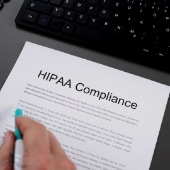 Social media has become a vital tool for healthcare organizations, allowing them to reach patients, share information, and build strong brand identities. However, social media can easily collide with the Health Insurance Portability and Accountability Act (HIPAA), putting patient privacy at risk. To keep your healthcare organization on the right side of compliance, it’s essential to understand the potential pitfalls and implement preventive safeguards.
Social media has become a vital tool for healthcare organizations, allowing them to reach patients, share information, and build strong brand identities. However, social media can easily collide with the Health Insurance Portability and Accountability Act (HIPAA), putting patient privacy at risk. To keep your healthcare organization on the right side of compliance, it’s essential to understand the potential pitfalls and implement preventive safeguards.
When social media conflicts with HIPAA
Unintentionally sharing protected health information (PHI) is a common misstep on social media. Examples include:
- Sharing patient information: Posting any form of PHI such as text, images, or videos, about patients is a red flag. Even if the patient’s name is omitted, their diagnosis or treatment could identify them.
- Visible background details: Sometimes, the background of a photo can reveal sensitive information unintentionally. For example, the background may contain name tags, medical documents, or get-well cards.
- Casual conversations: Discussing patient matters over social media, even without mentioning names.
The consequences of violating HIPAA
HIPAA violations are a serious matter. If there has been a violation, both employees and organizations could face severe fines, with civil penalties ranging from $137 to $68,928 per violation, depending on the severity. In addition, criminal violations carry a minimum fine of $50,000.
These monetary penalties can pile on top of each other, reaching into the millions of dollars. Besides financial consequences, there could be jail sentences up to 10 years, lawsuits, job termination, and even revocation of medical licenses, making violation prevention all the more critical.
Tips for preventing HIPAA violations on social media
With all that said, healthcare organizations can still benefit from social media without compromising patient privacy by implementing a few straightforward steps.
- Avoid posting patient stories: As has been stated, even diagnosis or treatment details could still identify the patient. It’s better to be safe than sorry.
- Check photos thoroughly: Before sharing any photos, double-check the background for any visible patient information.
- Refrain from giving medical advice: Social media is not the place for medical diagnosis or treatment plans. Even if a patient asks for advice, it’s best to redirect them to a private, secure channel.
- Get written permission: Sometimes, you might want to share an inspiring patient story. In such cases, always obtain written permission from the patient. This ensures that you have their consent and are protected from potential violations.
- Train your employees: Regular training sessions on HIPAA security and privacy procedures are essential. Make sure your staff understands responsible workstation use, workstation security, and the usage policy regarding personal devices for work.
Staying HIPAA-compliant on social media is not just a legal requirement but a moral obligation to protect patient privacy. By following the tips and best practices outlined in this post, healthcare organizations can leverage social media effectively without compromising compliance.
Disclaimer: This article provides general information and is not intended as legal advice. It’s essential to consult with legal counsel for specific guidance.
For more information on creating HIPAA-compliant social media policies or managing your healthcare organization’s privacy, feel free to reach out to our experts.



